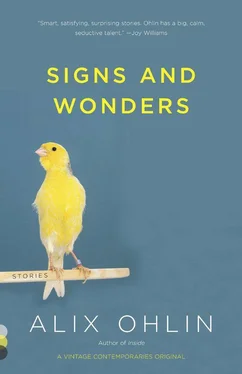Alix Ohlin - Signs and Wonders
Здесь есть возможность читать онлайн «Alix Ohlin - Signs and Wonders» весь текст электронной книги совершенно бесплатно (целиком полную версию без сокращений). В некоторых случаях можно слушать аудио, скачать через торрент в формате fb2 и присутствует краткое содержание. Год выпуска: 2012, ISBN: 2012, Издательство: Random House, Inc., Жанр: Современная проза, на английском языке. Описание произведения, (предисловие) а так же отзывы посетителей доступны на портале библиотеки ЛибКат.
- Название:Signs and Wonders
- Автор:
- Издательство:Random House, Inc.
- Жанр:
- Год:2012
- ISBN:9780307948649
- Рейтинг книги:3 / 5. Голосов: 1
-
Избранное:Добавить в избранное
- Отзывы:
-
Ваша оценка:
- 60
- 1
- 2
- 3
- 4
- 5
Signs and Wonders: краткое содержание, описание и аннотация
Предлагаем к чтению аннотацию, описание, краткое содержание или предисловие (зависит от того, что написал сам автор книги «Signs and Wonders»). Если вы не нашли необходимую информацию о книге — напишите в комментариях, мы постараемся отыскать её.
Signs and Wonders — читать онлайн бесплатно полную книгу (весь текст) целиком
Ниже представлен текст книги, разбитый по страницам. Система сохранения места последней прочитанной страницы, позволяет с удобством читать онлайн бесплатно книгу «Signs and Wonders», без необходимости каждый раз заново искать на чём Вы остановились. Поставьте закладку, и сможете в любой момент перейти на страницу, на которой закончили чтение.
Интервал:
Закладка:
Jennie nestled her head onto her mother’s shoulder and sighed. “I thought he didn’t look good earlier,” she said. “He was rubbing his arm when he was talking to me before the show.”
“Really?” Ruth said.
“He was.”
“He said it was a racquetball injury,” Ruth said.
Marlena sighed. “He hasn’t played racquetball in months,” she said.
Ruth didn’t know if she was pleased or displeased that George would still bother to lie to her. The most explicit expressions of his love had always been the least palatable: getting jealous of another man at a party, or complaining that she never dressed up for him anymore. But the fact that he’d lied about his fitness — what could this mean, to either of them, after four decades? She turned it over in her mind for a few minutes, then gave up. She’d known the marriage was truly over when she stopped trying to figure things out; this was Reason #466 why they’d gotten divorced. Although if she weren’t still trying, then why was she still counting the reasons?
A doctor came over, not Vasanji but an impossibly young man with wide-set, gentle brown eyes that made her think of a deer. Holding a clipboard, he pulled up a chair opposite the three of them. “I am Dr. Thanh,” he said. “I need to ask which if you is the next of kin,” he said.
Ruth was relieved to hear English. At least it wouldn’t be a French conversation she’d have trouble following.
Marlena held out her hand to him, like a queen, Ruth thought. Her mannerisms were absurd. “I’m his wife,” she said.
“There are forms here,” he said. “Unfortunately, we must fill them out.” His eyes refused to look down at his clipboard, as if the facts there were too impolite to acknowledge. “Regarding your husband’s future. In case”—he paused delicately—“the operation is not a success.”
“Oh,” Jennie said softly.
“I’ll take them,” Marlena said, and again extended her hand with that ridiculous regal air. The doctor gave her the clipboard and murmured something about returning it to the nurses’ station when she was done. Marlena walked across the room and sat down in a chair next to a table.
“Wait a minute,” Jennie said loudly. Other people who were waiting looked up and stared at her bizarre appearance. “What are you doing?”
“Filling out the forms, dear,” Marlena said sweetly. “It’s nothing you need to worry about.”
“Maybe I want to worry about it,” Jennie said. “What is it about? You can’t just go off and decide everything yourself, without us. You can’t keep us out of this. You can’t.”
Her voice broadcast unadulterated anger, and Ruth was surprised at the surge of satisfaction she felt at hearing that permanent, unbreakable us. For a moment she saw how it must have been for Marlena for all these years, knowing her every action would be scrutinized, that she would forever find herself on the other side of us.
“Jennie,” she said.
Her daughter ignored her, and Marlena didn’t even look up from the clipboard. Pen in hand, she filled out the form. Jennie began to moan, rocking back and forth.
Ruth put her arm around her. “He won’t die,” she said quietly. “Nothing bad is going to happen. Don’t worry.”
Jennie wasn’t crying but she was shaking, and she held her mother’s hand and pressed her body against hers, side to side. She was warm and smelled of sweat and hairspray. As Ruth told her, over and over, that there was nothing to worry about, that this surgery was done all the time, that her father would be okay, she listened and nodded to each statement as if thinking it over very carefully. “Yes,” she said quietly to every sentence. Finally she stood up. “I’m going to take off my makeup,” she said. “I look stupid.”
“That sounds like a good idea,” Marlena said from the other side of the room. She meant to be encouraging but it sounded sarcastic, and Jennie’s eyes rolled in annoyance as she left. Ruth saw that Marlena, having put down the pen, looked exhausted, with blue veins showing beneath her rouge.
“He’s seemed so run-down lately,” Marlena said. “I should’ve noticed.”
“George is a grown man. He should know enough to go to the doctor if he isn’t feeling well.”
“He can’t take care of himself,” Marlena said. “He needs me.”
Ruth didn’t answer this, and they were silent until Jennie rejoined them, freshly scrubbed, white residue at her hairline. Her daughter’s face was lined and weary and worried; for all her bluster, she was quiet now. Marlena was quiet too. The three of them waited together while George lay somewhere in the building having his chest opened up. The truth, Ruth thought, was that she hardly knew what George needed, except for competent doctors and good luck. But each of them needed him: to push against, to argue with, to care for. Years and years could pass and this fact would never change. They were together in this, three little maids who waited for the man to pull through.
You Are What You Like

It was typical Dilrod to come to town at a bad time. He’d shown up at Jill and Stefan’s when they’d just moved in together, right after his first divorce, in need of comfort and a drinking buddy, which for him were the same thing; then he’d visited on the heels of their honeymoon to announce his second engagement, in need of celebration and a drinking buddy, which were also the same thing. Now he was divorced again and seeing somebody new, coincidentally in town on business, and Stefan invited him over, even though the baby was only six months old and half-crazy with colic and neither of them had had a solid night’s sleep since she’d been born, or, in Jill’s case, a couple of months before that.
Dilrod was Stefan’s oldest friend. Since high school their values, places of work, tastes in women, music, movies, and books — Dilrod didn’t read, actually — had diverged dramatically, but they’d known each other so long that time itself provided a string of connection. By keeping in touch they were staying loyal not so much to each other as to their own young, reckless pasts, which they somehow hoped — though, Jill thought, they’d never admit this — to meet again.
She ordered Thai for dinner, which seemed like the easiest thing. She hadn’t cooked a real meal since Phoebe came. Sometimes Stefan did, or her mother visited for a weekend and built up a battery of stews and lasagnas she left behind in the freezer in individual Tupperware containers, solid Midwestern comfort food that Jill had hated as a teenager but now made her weepy with gratitude.
“This is great,” Stefan said, coming into the kitchen. It was only the dinner table set with real plates and place mats and utensils but it seemed, after the chaos of recent months, an unaccountably luxurious, grown-up affair. She’d even put candles out, though Phoebe’d started crying so half the holders were empty. Even so, they smiled at each other. “I’m so excited about this,” he went on. “A real meal, it feels like ages.”
“I just hope it doesn’t mess her up, like that spicy broccoli I had that time,” Jill said. “Or those cheeses.”
“Yeah,” he said absently, turning away, then went off for more candles. Jill sighed. Stefan was amazing with the baby; he coddled her, changed her diapers, rocked her to sleep, did half of everything except the breast-feeding. He was all she could have wanted in a father. But in the past few months — after he went back to work — he’d started making these ironic, self-parodying jokes about having an “old lady” and calling the baby a “rug rat” and being an old-fashioned dad who didn’t change diapers. Everybody was supposed to play along with this, because to imagine that’s how he truly thought or felt would be ridiculous, but of course by dint of making the jokes he was also raising an issue, a thin whine of complaint and protest.
Читать дальшеИнтервал:
Закладка:
Похожие книги на «Signs and Wonders»
Представляем Вашему вниманию похожие книги на «Signs and Wonders» списком для выбора. Мы отобрали схожую по названию и смыслу литературу в надежде предоставить читателям больше вариантов отыскать новые, интересные, ещё непрочитанные произведения.
Обсуждение, отзывы о книге «Signs and Wonders» и просто собственные мнения читателей. Оставьте ваши комментарии, напишите, что Вы думаете о произведении, его смысле или главных героях. Укажите что конкретно понравилось, а что нет, и почему Вы так считаете.












